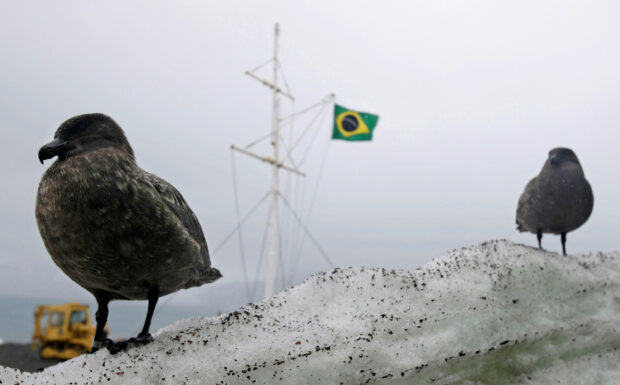UK detects first bird flu case in mammals in sub-Antarctica

A pair of Petrels are seen in front of the Commandante Ferraz Brazilian Antarctic Station on the Antarctic continent November 25, 2008. REUTERS/Paulo Whitaker (ANTARCTICA)/File Photo
LONDON — Bird flu has been detected for the first time in mammals in sub-Antarctica, Britain’s Animal and Plant Health Agency (APHA) said on Thursday, raising concerns the virus could spread and threaten large populations of wildlife in the region.
The APHA said highly pathogenic avian influenza (HPAI) was found in elephant and fur seals on the island of South Georgia, a UK overseas territory situated in the Southern Atlantic Ocean. It had been testing for bird flu in mammals in the region since it was first suspected last year.
“Given Antarctica is such a unique and special biodiversity hotspot it is sad and concerning to see the disease spread to mammals in the region,” the APHA’s Director of Scientific Services Professor Ian Brown said, adding very large populations of seabirds and sea mammals could be put at risk.
The sub-Antarctic refers to a region immediately north of the Antarctic, containing multiple islands.
APHA said the data suggested there had not been a widespread adaptation of the virus and there was no increased risk to humans, with the risk of human infection remaining very low.
South Georgia, around 1,000 kilometers (620 miles) south east of the Falkland Islands and only accessible by ship, has some of the most closely monitored seabird colonies in the world.
H5N1 was first suspected on an island off the northwest coast of South Georgia in October after several brown skua died. The agency said data from the infected birds indicated the virus had likely been introduced by migratory bird movement from South America.
Brown said samples would be shared with the agency’s international partners to assist efforts to tackle the virus, but warned that uncertainties remain as to how it was infecting and spreading.
Last year, there were a number of outbreaks of avian flu across Europe, the United States, Japan and south American nations, leading to the deaths of thousands of birds and mammals.
Millions of farm animals in the past years have also been culled to prevent the spread of the highly contagious virus.